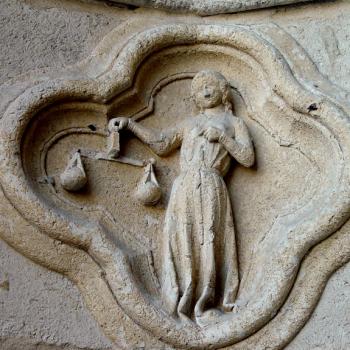
One of the great challenges of the Christian faith, and indeed, something which is very difficult for most of us, is the expectation that we are to love everyone, including our enemies. Everyone is made in the image and likeness of God, and everyone, due to that, deserves love. Everyone, likewise, has good in them, and so everyone deserves to be loved in accordance to that good. Nonetheless, we find ourselves often in conflict with others, sometimes due to our own actions, sometimes due to theirs. The challenge is not to let those conflicts, and whatever antagonism we feel towards others, get the best of us. We are to love others, despite what they have done. We are to care for them and hope for the best for them. This does not mean we are to neglect justice; if we are dealing with someone who has caused great pain and sorrow, we should expect them to make restitution for their actions. Justice must always be mixed with mercy and grace. We should not to look for and nor create a fake peace with those who have caused harm, acting like what they have done does not matter; it matters, but we must always keep in mind, when dealing with them, our goal should always be that we find a just and merciful end to our conflict with them, one which has them make restitution when needed. This is impossible if we let hatred instead of love guide our efforts. We must always seek after the greater good, one which makes room for everyone, instead of the lesser good which merely seeks to eliminate and destroy those who get in our way. A false peace follows the path of destruction, where those who cause pain and sorrow are annihilated, including all the good contained in them, which of course, leads to even more pain and sorrow. Jesus, therefore, challenges us today, even as he challenged his audience during his earthly ministry, when he said:
And as you wish that men would do to you, do so to them. “If you love those who love you, what credit is that to you? For even sinners love those who love them. And if you do good to those who do good to you, what credit is that to you? For even sinners do the same. And if you lend to those from whom you hope to receive, what credit is that to you? Even sinners lend to sinners, to receive as much again. But love your enemies, and do good, and lend, expecting nothing in return; and your reward will be great, and you will be sons of the Most High; for he is kind to the ungrateful and the selfish. Be merciful, even as your Father is merciful (Lk. 6:31-36 RSV).
Instead of reinforcing antagonism, by looking at what is bad in others, we must find a way to discern the good which is in them. Again, this does not mean we ignore the bad, and so ignore justice, for we must deal with injustices, but the way to do that is through restorative justice instead of retributive justice. In doing so, we will be doing as Jesus said, doing good for our enemies, as we will sake to make them so much better that they will no longer be our enemy.
Evil returned for evil only promotes evil. This is why those who otherwise go around judging others, condemning them for their apparent sins, are in the wrong, for they are not acting out of love, no matter how much they say they are. St. Nonnus, the Bishop of Edessa, understood this, and saw, within his community, that they had yet to grasp the love which Christ wanted Christians to have. St. Pelagia, who at the time was an actress turned prostitute, found many Christians were unwilling to look upon her; they turned their backs on her, showing her contempt instead of love. Nonnus, on the other hand, was willing to look upon her, to speak with her with care and concern, giving her a sense of dignity. He took her situation into his heart, prayed for her and did what he could to help her come to the Christian faith. His actions were more than successful, for she went from worldly glory, as an actress turned prostitute, to spiritual glory, becoming an ascetic at the Mount of Olives (where she took on the name and identity of a monk named Pelagius). She fulfilled the potential he knew was in her. He did not let judgment or condemnation lead him to treat her with harsh contempt, but rather, he let the great goodness within her, which he saw and others could not see, become revealed, for the glory of God.
We must strive to see the hidden goodness and potential of others, helping them engage it for themselves instead of feeling so bad for what they have done that they fall into despair thinking that they can never attain their potential. That will have many think they should not even try to do so. We have, however, the example of the Apostle Paul, one which shows how much grace can change and transform a person. Before his conversion, Christians would have seen him as an enemy, for he caused them great harm; they would have found it difficult to see the good in him. Upon his conversion, they had to accept the one who had once made himself their enemy, and love him. Of course, they would have known that was expected of them even if he did not convert, because of what Jesus said, but his place among the Christian community made what would have been a theoretical issue a real one. Conversion does not make someone instantly perfect; everyone, converts and long-term Christians alike, should realize it is not easy to follow Christian ideals. When we see someone falter, we should not use that to justify contempt, for if we did, we would have that as a reason to expel Paul and his teachings from our tradition. Paul said he had a thorn in the flesh which was always with him, a thorn which indicated how far he was from Jesus’ expectations, and yet a thorn which Paul said ultimately served to keep him humble and remember it is grace, not himself, which ultimately saves us (cf. 2 Cor. 12:7-9). That thorn kept him humble, and with that humility, he was able to appreciate weaknesses in others. Let us, therefore, examine ourselves, see the various thorns in our flesh. Let us use them like Paul did. Let us see how we can and should trust in God despite them, trust in grace, and through that grace, realize others are like us, that they have weaknesses, which need to be shown mercy instead of malice. Just as God’s grace is sufficient for us, it is sufficient for them. We must trust in God. It is that trust which allows us to do what is otherwise impossible, that is love our enemies, for it is our trust which leads us to accept God’s ability to transform anyone, to make them better, indeed, to make rivals into friends. Loving our enemies is about transcendence, of overcoming the duality in the world, and finding a way that all might be one, bound together by that love, so that together as one, we can find ourselves loved by God, no matter what we have done before.
Stay in touch! Like A Little Bit of Nothing on Facebook.
If you liked what you read, please consider sharing it with your friends and family!
N.B.: While I read comments to moderate them, I rarely respond to them. If I don’t respond to your comment directly, don’t assume I am unthankful for it. I appreciate it. But I want readers to feel free to ask questions, and hopefully, dialogue with each other. I have shared what I wanted to say, though some responses will get a brief reply by me, or, if I find it interesting and something I can engage fully, as the foundation for another post. I have had many posts inspired or improved upon thanks to my readers.













